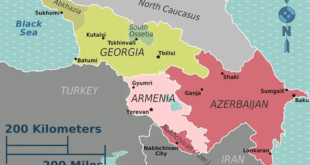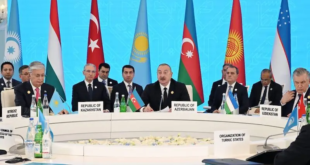 The position of top commander in Dagestan’s Sharia Jamaat has been vacant for a month now since the death of its former leader Abdul-Majjid on September 8th near the Dagestan-Azeri border during a joint Russo-Azeri special forces operation that lasted over 10 days (www.azeri.ru/papers/echo-az_info/26465). Commenting on the event, the press service for the Dagestan front of the Caucasus Emirate Armed Forces (www.jamaatshariat.com) released a statement online clarifying the jamaat’s position and reiterating its commitment to the unified chain of command led by Dokka Umarov. It is not quite clear why the rebel movement felt the need to provide an explanation during the time between the death of the former leader and the appointment of his successor, which is likely to be made in a matter of days. The statement may have been meant as a response to any potential dissenters within the jamaat or a reaction to an emerging internal discord. The fact that similar commentary has already been published on the jamaat’s website in the last month may provide more indirect evidence of rival factions within the ranks of the Sharia Jamaat. In any event, the media so far has not reported any dissent, which may mean that these trends have not gained much ground within the movement or that they are limited to a particular unit or area in Dagestan.Â
The position of top commander in Dagestan’s Sharia Jamaat has been vacant for a month now since the death of its former leader Abdul-Majjid on September 8th near the Dagestan-Azeri border during a joint Russo-Azeri special forces operation that lasted over 10 days (www.azeri.ru/papers/echo-az_info/26465). Commenting on the event, the press service for the Dagestan front of the Caucasus Emirate Armed Forces (www.jamaatshariat.com) released a statement online clarifying the jamaat’s position and reiterating its commitment to the unified chain of command led by Dokka Umarov. It is not quite clear why the rebel movement felt the need to provide an explanation during the time between the death of the former leader and the appointment of his successor, which is likely to be made in a matter of days. The statement may have been meant as a response to any potential dissenters within the jamaat or a reaction to an emerging internal discord. The fact that similar commentary has already been published on the jamaat’s website in the last month may provide more indirect evidence of rival factions within the ranks of the Sharia Jamaat. In any event, the media so far has not reported any dissent, which may mean that these trends have not gained much ground within the movement or that they are limited to a particular unit or area in Dagestan.Â
As for the website of the Sharia Jamaat, its editors claim that it had one and a half million visits during the last eighteen months (www.jamaatshariat.com/content/view/889/34). If this claim is even half true, that would make the website the most popular mass media outlet in Dagestan. That conclusion rings true, as evidenced by young people’s growing interest in the jamaat’s activities and vigorous discussions in various internet forums that point to an increasing radicalization thanks to the influence of the armed opposition in the North Caucasus.
Â
Despite the blows suffered by the Sharia Jamaat in southern Dagestan in early September 2008, the organization’s activities are far from paralyzed. The loss of individual jamaat leaders today is not as devastating as it was in 1999-2001. Currently all small units of the jamaat operate essentially as autonomous cells, and coordinate only as necessary when certain military actions calls for the involvement of more than one unit (these typically include only a handful of people, numbering 5 to 15 members depending on the location). Therefore, a unit leader’s death results in temporary interruptions in the unit’s communications with other groups, including top commanders represented by Dokka Umarov, who maintains contacts with the jamaat’s upper and middle ranks.
Â
During the week of October 20-26, the Sharia Jamaat undertook several major raids against units of Dagestan’s Interior Ministry. To name just one, around noon on October 21, a small unit of 15 jamaat fighters fired shots at a police unit, killing 38-year old Ruslan Muyidov, a police captain and deputy head of Sergokalinsky district Interior Ministry branch. Two other district employees were wounded (Itar-Tass, October 21). A three vehicle OMON (Special Purpose Police Squad) convoy that rushed to the rescue from the village of Gubden was ambushed near the village of Janga during a short shootout that left five policemen dead, including three officers and seven or eight wounded (Ekho Moskvy Radio, October 21). The casualties included the chief of the Gubden village police district, two OMON fighters and a police intern (Interfax, October 21). No reports of casualties among the rebels were available. Efforts to block off the area where the attack took place in order to hunt down jamaat fighters were not successful.
Â
There was an attempt on October 21 to assassinate Dagestan’s sports affairs minister, Budun Budunov. His car was fired on in Makhachkala, the republic’s capital. Later in the evening, a vehicle carrying policemen in the downtown area was blown up, wounding two policemen and shattering windows in the nearby buildings, and causing other minor damages (http://www.rian.ru/incidents/20081022/153622391.html).
Â
The two incidents of October 21 prompted an extraordinary unscheduled meeting of Dagestan’s Security Council chaired by Dagestan puppet President Mukhu Aliev on the morning of October 22 to identify measures to improve the situation in the republic (www.rian.ru/society/20081022/153650484.html).
Â
The following day, October 22, the police and jamaat members clashed in a shootout at a gas station on the Makhachkala-Derbent highway. The rebels fled in a vehicle and escaped the police who were in pursuit. There were no casualties and no reports available about any losses among the attackers (Interfax, October 22).
Â
At 1 a.m. on October 23, an unidentified male threw a grenade at a police post in downtown Makhachkala. A policeman was wounded and the attacker escaped unharmed (www.echo.msk.ru/news/509593-echo.html).
Â
On the evening of October 25, an unidentified man opened fire on the police station located in the central square of Makhachkala that houses the buildings of the city administration, the parliament and Dagestan’s Interior Ministry. The attacker was shot dead while attempting to flee the scene of the attack (www.nr2.ru/incidents/192688.html).
Â
Another high-profile operation in the Dagestan capital of Makhachkala took place late in the evening of October 26, when the chief of criminal police of Makhachkala’s Sovietsky district, 48-year old police Lieutenant Colonel Gasan Kerimov, was killed when shots were fired at his vehicle (RIA Novosti, October 27).
Â
Also on October 27, the government moved to quash the rebels and arrested 17 individuals suspected of participation in illegal armed groups (Kavkazky Uzel, October 27). However, it would be premature to label them as jamaat members, given that this would not be the first time the government conducted a high-profile operation to detain rebel fighters only to quietly let them go after thorough investigations failed to turn up any evidence.
Â
On October 28, rebels in the Sergokalinsky district fired shots at the police forces, who this time managed to kill three of the attacking Sharia Jamaat fighters (www.lenta.ru, October 28).
Â
On October 30, Mustapa Abdurrakhmanov, a 37-year old member of the human rights organization “Dagestan’s Mothers for Human Rights,” was found dead (the government hastily declared the deceased an active member of the rebel army and denied his human rights defender status). If the government’s version is true, then it is not clear why Abdurrakhmanov had to be killed, or why-if the government was aware of his membership in the Sharia Jamaat-he was not arrested earlier. Moreover, the government announced that Abdurrakhmanov was killed two days before his body was discovered-that is, during the special forces operation in the Sergokalinsky district of Dagestan. In all likelihood, to avoid a high-profile case involving the murder of a human rights activist combined with past murders of journalists, the government decided to blame the rebels, thus making it unnecessary to come up with a justification for his murder. That is a typical practice in the North Caucasus.
Â
On the night of November 1, an explosion went off in downtown Makhachkala. According to the police, the attack targeted policemen who were driving down Imam Shamil Street at the time of the blast (Kavkazky Uzel, November 2).
Â
Last week’s events clearly demonstrate that assaults targeting policemen are not isolated incidents but rather a distinct policy of the armed opposition and specifically the Sharia Jamaat of Dagestan. The identity of their next top commander or the projected time of his appointment by Dokka Umarov does not seem to be affecting the jamaat’s operations in Dagestan in any way, thus confirming that the death of the jamaat’s leader no longer deals a crippling blow to its fighters.
Â
By Mairbek Vatchagaev
Source: The Jamestown Foundation
 Eurasia Press & News
Eurasia Press & News



